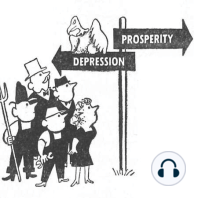60 min listen

David Stein on *Fearing Inflation, Inflating Fears*
David Stein on *Fearing Inflation, Inflating Fears*
ratings:
Length:
83 minutes
Released:
Jun 28, 2021
Format:
Podcast episode
Description
This week we talked to David Stein about his dissertation, "Fearing Inflation, Inflating Fears" and the centrality of full employment to the black freedom struggle. From the 1930s through the 1970s, the fight for a job went hand in hand with the fight for freedom and equality. The proposal for a Job Guarantee, it turns out, has multiple origins - one was in the fight against Jim Crow monetary policy. Cold War complications ultimately undid the movement for a time, but its coming back today. *** LINKS ***Follow David on Twitter @DavidpSteinRead David's work at the Boston Review, "Why Coretta Scott King Fought For a Job Guarantee" here: http://bostonreview.net/class-inequality-race/david-stein-why-coretta-scott-king-fought-job-guarantee And find the rest of his academic publications here: https://ucla.academia.edu/DavidSteinAlso mentioned: - Who Makes Cents podcast (now run by Jessica Ann Levy), https://whomakescentspodcast.com/- Landon Storrs, *The Second Red Scare and the Unmaking of the New Deal Left* https://press.princeton.edu/books/hardcover/9780691153964/the-second-red-scare-and-the-unmaking-of-the-new-deal-left- Destin Jenkins on white fraternity, https://www.youtube.com/watch?v=9iAGfuPJqM8- Cedric Robinson, http://bostonreview.net/race-philosophy-religion/robin-d-g-kelley-why-black-marxism-why-now- Kristoffer Smemo and Samir Sonti, and Gabriel Winant on the 1958 recession, https://www.journals.uchicago.edu/doi/full/10.1086/690968
Released:
Jun 28, 2021
Format:
Podcast episode
Titles in the series (24)
Monica Prasad on *The Land of Too Much and Mortgage Keynesianism* by Reviving Growth Keynesianism